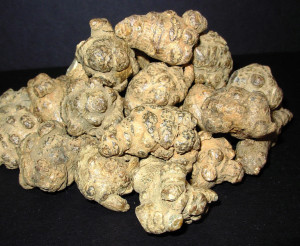Tienchi, also known as San qi, Tian qi, Panax pseudoginseng, and Panax notoginseng, is a perennial plant native to China and Japan. It is an Asian variety of ginseng that features dark green leaves and a cluster of red berries.
Contents
Uses
Tienchi has been used for hundreds of years as an herbal medicine to treat pain and swelling associated with traumatic injuries, as well as chronic conditions, such as diabetic retinopathy and glaucoma.
Benefits
- Ginsenosides and flavonoids are the chemicals in tienchi that have beneficial properties. Laboratory tests have shown that ginsenosides generally inhibit the growth of cancer cells and boost the immune response to foreign bodies, such as viruses and bacteria. Ginsenosides also reduce the formation of unwanted blood vessels in the eye, which is a common problem with diabetes and age-related macular degeneration.
- Flavonoids are antioxidants that typically protect cells from the damaging effects of reactive oxygen molecules — also known as free radicals. They also enhance the antioxidant properties of vitamin C and promote the production of glutathione — another potent antioxidant. In addition, flavonoids generally reduce inflammation and disrupt the function of some microorganisms.
- Although the medicinal benefits haven’t been conclusively established, the plant has been used in Chinese medicine to stop bleeding and reduce bruising. Conditions that cause bleeding in the respiratory tract, digestive tract, and urinary tract typically show signs of improvement when treated with tienchi. Sports injuries, such as sprains, fractures, and muscle inflammation, are commonly treated with tienchi because of its ability to improve blood flow to the injured area. There is some evidence that tienchi can even reduce the recovery time after surgery.
Cautions
- Taking high doses of the plant can lead to side effects, such as nervousness and trouble sleeping. Other commonly reported problems include chest pain, headaches, nosebleeds, and nausea. When taken in combination with central nervous system stimulants, the effects are typically compounded, thus leading to an irregular heartbeat and excessive sweating. Pregnant or nursing women should avoid tienchi because the effects of the plant on infants have not been determined.
Interactions
- None are recorded. Please talk to your doctor.
Other names
San qi, Tian qi, Panax pseudoginseng, and Panax notoginseng
References
Source: WiseGeek, http://www.wisegeek.com/what-is-tienchi.htm

